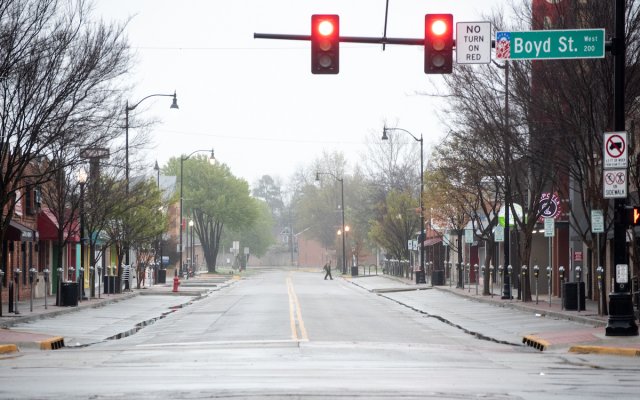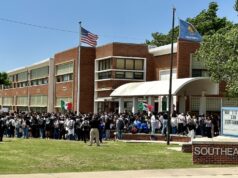

The governor’s order closing or adjusting all non-essential business in Oklahoma counties identified with community transmission of COVID-19 was matched by a similar municipal order in Norman on Tuesday.
In addition to certain business closures, the “safer at home” portion of Gov. Kevin’s Stitt’s COVID-19 shutdown order, is effective through April 30. It instructs people age 65 and older and the medically compromised in all 77 counties to stay at home. Those individuals are asked only to leave their homes for essential needs, such as obtaining groceries or prescriptions.
But Norman Mayor Breea Clark’s “stay at home” order went further, applying to all citizens, no matter their age or medical condition, except for those engaged in essential business and government work.
“The stay-at-home order is the best decision we can make with the information we have at this time to keep our community safe,” Clark said in a video message released to the public.
The Norman order allows citizens to travel only to perform essential activities, such as obtaining medical services or supplies, grocery shopping and caring for family members. It also permits certain outdoor activities, such as walking, biking, hiking and running. The Norman order will take effect at 11:59 p.m. tonight and will continue until April 14.
It is also more specific than the governor’s order in identifying which businesses are considered “essential” and are exempt from the closure edict. Norman’s COVID-19 shutdown order (embedded below) lists the following as essential businesses:
- Healthcare Operations and Essential Infrastructure;
- Grocery stores, farmers’ markets, farm and produce stands, markets, food banks, convenience stores, liquor stores, and other establishments engaged in the retail sale of canned food, dry goods, fresh fruits and vegetables, drinks, pet supply, fresh meats, fish, and poultry, and any other household consumer products such as cleaning and personal care products. This includes stores that sell groceries and also sell other non-grocery products, and products necessary to maintaining the safety, sanitation, and essential operation of residences and persons;
- Food cultivation, including farming, livestock, and fishing;
- Human and animal food processing facility workers;
- Businesses that provide food, shelter, and social services, and other necessities of life for economically disadvantaged or otherwise needy individuals;
- Newspapers, television, radio, and other media services;
- Gas stations and auto-supply, auto-repair, and related facilities;
- Banks and related financial institutions;
- Hardware stores and stores that sell essential home appliances and related equipment;
- Stores that sell telecommunication and devices;
- Plumbers, electricians, exterminators, and other service providers who provide services that are necessary to maintaining the safety, sanitation, and essential operations of residences, Essential Activities, and Essential Businesses;
- Businesses providing mailing and shipping services, including post office boxes;
- Laundromats, dry cleaners, and laundry service providers;
- Railroads, rail systems, and other forms of public transit;
- Restaurants and other facilities that prepare and serve food and drink, but only for delivery or carry out. Entities that typically provide free food to members of the public may continue to do so under this Proclamation on the condition that the food is provided on a pick-up or takeaway basis only;
- Businesses that supply products needed for people to work from home;
- Businesses that supply other essential businesses with the support or supplies necessary to operate;
- Businesses that ship or deliver groceries, food, goods or services directly to residences;
- Airlines, taxis and other private transportation providers providing transportation services necessary for Essential Activities and other purposes expressly authorized in this Proclamation, as well as transportation maintenance services such as mechanics necessary to keep transportation services operational;
- Home-based care for seniors, adults, or children;
- Residential facilities and shelters for seniors, adults, and children;
- Professional services, such as legal or accounting services, when necessary to assist in compliance with legally mandated activities;
- Childcare facilities providing services that enable employees exempted from this Proclamation to work as permitted. To the extent possible, childcare facilities should operate under the following conditions:
- Childcare should be carried out in stable groups, preferably with 10 or fewer children (“stable” means that the same 10 or fewer children are in the same group each day with the same childcare provider);
- If more than one group of children is cared for at one facility, each group should be in a separate room and should not mix with one another….”
State order uses Department of Homeland Security definitions
By comparison, the order issued by Stitt directed all businesses not included in the U.S. Department of Homeland Security’s definition of the “critical infrastructure sector” and situated within a county experiencing community spread of COVID-19 to close. Today, the number of counties featuring at least one diagnosis rose from 19 to 27, with eight new counties included: Adair, Bryan, Carter, Creek, Delaware, Osage, Pottawatomie and Stephens.
The Homeland Security guidelines generally define as essential those workers in medicine and health care, telecommunications, information technology systems, defense, food and agriculture, transportation and logistics, energy, water and wastewater, law enforcement and public works.
Especially important to Oklahoma, the Homeland Security guidelines specifically list natural gas and petroleum product storage, pipeline, transport, drilling and refinery employment as included in the essential or “critical infrastructure” sectors.
Later on Tuesday, Stitt supplemented his order to include other occupations within the “essential” sectors, including certain health care providers and medicinal marijuana dispensaries. Late Wednesday, he supplemented it again to add dozens of professionals from several other industry sectors, including manufacturing, public works, transportation, financial services and legal services.
The supplemental order also added some law enforcement, child welfare workers and private security officers to the essential list, along with “faith-based services” provided through streaming or other technology and school workers supporting public and private schools’ distance learning programs and school meals services.
The City of Norman announced on its website that police enforcing the “stay at home” order would take an “education, warning, and then citation” approach, but different treatment could be taken with “particularly egregious violations that constitute an imminent danger.” Violators could be prosecuted and be subject to a $50-$750 fine or 60 days in jail per violation.
Read Norman’s stay-at-home order
 Loading...
Loading...
(Update: This article was updated at 5 p.m. Wednesday, March 25, to include Stitt’s additional designations of industries as “essential.” It was updated again at 6:40 p.m. to correct the spelling of Clark’s name.)




















